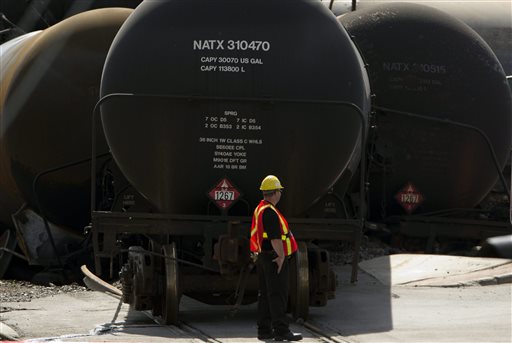WASHINGTON – Maine Reps. Mike Michaud and Chellie Pingree on Wednesday urged federal regulators to finalize new design standards for the type of railroad tanker car involved in the derailment and explosions that killed dozens in Quebec earlier this month.
The New Brunswick & Maine Railways, which operates trains in Maine, meanwhile announced enhanced safety measures for parked trains — including rendering all unattended trains inoperable — in response to the disaster in Lac-Megantic, Quebec.
Pingree and Michaud said after a meeting in Washington with Deborah Hersman, the chairman of the National Transportation Safety Board, that they support requiring that the tank cars be redesigned. Hersman’s agency has raised concerns about the safety of the widely used DOT-111 tank car for several decades, but safety redesigns have been slow coming.
“We share Chairman Hersman’s concerns over DOT-111 design flaws, and we call on the Pipeline and Hazardous Materials Safety Administration to issue a new rule enhancing the design of these cars as soon as possible,” Michaud and Pingree said in a joint statement. “Regardless of the outcome of the investigation in Canada, we should all be able to agree that our railroads should be utilizing the safest cars possible when transporting hazardous materials through our communities.”
Maine Sen. Susan Collins also raised concerns about the DOT-111 cars during a conversation with Hersman within a week of the accident in Quebec. Collins said afterward that officials need to examine the integrity of the cars now that they are being used to ship crude oil across the country.
Two agencies within the U.S. Department of Transportation — the Federal Railroad Administration and the Pipeline and Hazardous Materials Safety Administration — write regulations governing railroads and the transportation of hazardous materials. However, the transportation safety board, as the agency in charge of investigating all rail and other transportation-related accidents, makes recommendations to those agencies.
The transportation safety board first raised concerns about the DOT-111 cars in 1991 and as recently as last year after a derailment in Illinois in which cars carrying highly flammable ethanol derailed and caught fire, killing one person.
All 72 cars on the Montreal, Maine & Atlantic Railway train that derailed in Lac-Megantic — killing at least 47 and destroying 30 buildings — were DOT-111 cars, carrying crude oil from the Bakken oil fields of North Dakota to an Irving refinery in St. John, N.B. Studies have found that the cars are prone to rupture during crashes, much more so than pressurized cars or tankers with thicker shells.
The American Association of Railroads has agreed to improve the crashworthiness of new cars, but they have resisted transportation safety board calls to retrofit the tens of thousands already in use. The Federal Railroad Administration also has opposed requiring retrofits. The Pipeline and Hazardous Materials Safety Administration is currently developing new rules for the DOT-111.
National Transportation Safety Board officials could not be reached for comment Wednesday night. However, in a letter sent to Pingree and Michaud earlier this week, Hersman reiterated her agency’s stance regarding the DOT-111.
“(The) NTSB is convinced that something must be done to increase the crashworthiness of these tank cars, which carry crude oil and other hazardous materials,” Hersman wrote.
The Montreal, Maine & Atlantic train that derailed in downtown Lac-Megantic had been parked and left unattended about seven miles outside of town, not far from the Quebec/Maine border. Preliminary reports suggest the train’s air brakes may have shut down after the locomotive was powered off by firefighters extinguishing a small fire, and a company official has questioned whether the engineer set enough hand brakes before leaving for the night.
Maine Department of Transportation officials had sent a letter earlier this month to the five freight rail operators in Maine asking them to submit existing or proposed policies and practices for securing parked trains. The request was part of the Maine DOT’s effort “to facilitate a voluntary, proactive effort to establish reasonable and common sense practices that address the risk of runaway freight trains.”
J.D. Irving subsidiary New Brunswick and Maine Railways announced Wednesday that the company recently issued new safety guidelines for parked trains. Those guidelines include:
• No unattended trains on “main lines” in New Brunswick and Maine.
• All trains that are left unattended on rail sidings or in rail yards must be “completely secured and rendered inoperable.”
• New hand brake policies for trains that take into account specifics regarding the size of the train and the terrain.
Washington Bureau Chief Kevin Miller can be contacted at 317-6256 or at:
kmiller@pressherald.com
Copy the Story Link
Send questions/comments to the editors.




Success. Please wait for the page to reload. If the page does not reload within 5 seconds, please refresh the page.
Enter your email and password to access comments.
Hi, to comment on stories you must . This profile is in addition to your subscription and website login.
Already have a commenting profile? .
Invalid username/password.
Please check your email to confirm and complete your registration.
Only subscribers are eligible to post comments. Please subscribe or login first for digital access. Here’s why.
Use the form below to reset your password. When you've submitted your account email, we will send an email with a reset code.